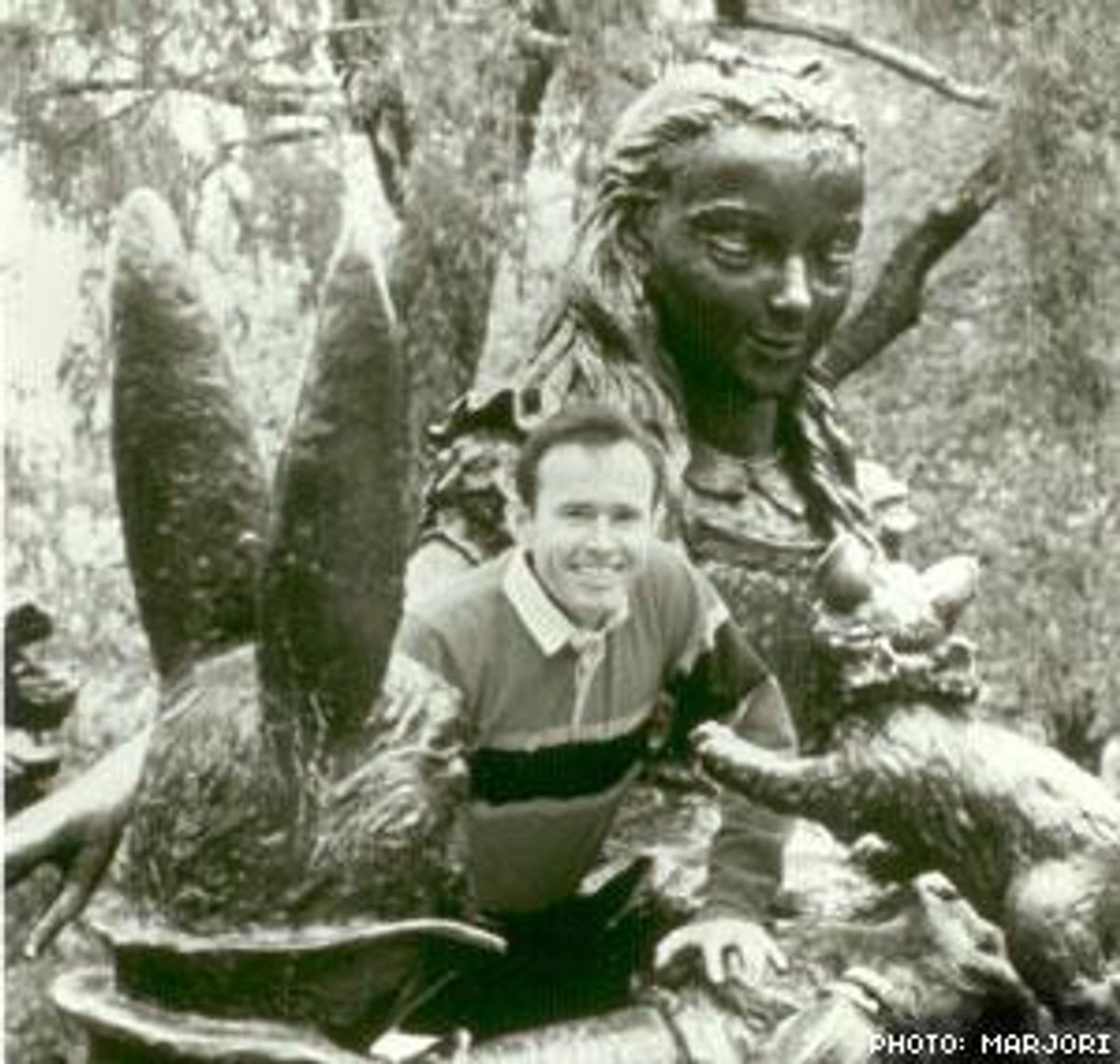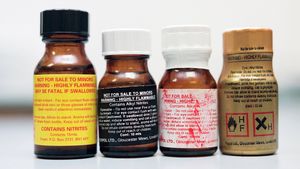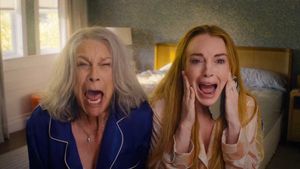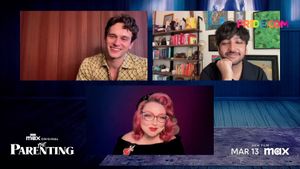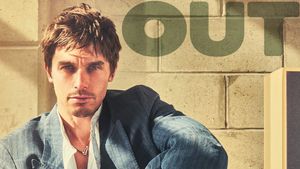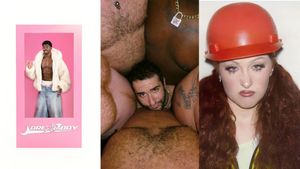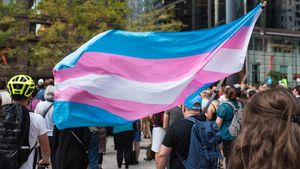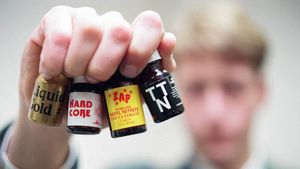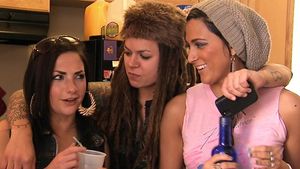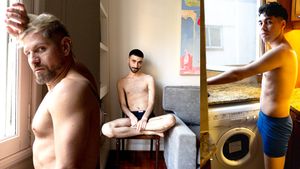If classical
music has a living gay icon, it is composer David Del
Tredici. Generally regarded as the founder of the
neoromantic movement, the California native has
garnered numerous awards during his long and busy
career. His early output was primarily focused on the works
of Lewis Carroll, whose writings he admits he
is somewhat obsessed with. Among these works are
the opera Final Alice, his best-known work, and
his Pulitzer Prize-winning "In Memory of a
Summer Day," part one of his song cycle Child Alice.
Since his
recovery from alcoholism in the late '80s, Del
Tredici has not only embraced his gayness but has
celebrated it in his art to an extent that few other
gay composers have. Now in his 70s, the still
energetic Del Tredici will premiere two new pieces -- My
Favorite Penis Poems, a musical interpretation
of six gay poets including Edward Field and Allen
Ginsberg, and Wondrous the Merge, an
interpretation of a work by the late gay poet James
Broughton -- December 4 at Symphony Space in New York
City.
Advocate.com:You're known as the father of neoromanticism. Is
that a title you accept?David Del Tredici: I accept it, and it's
probably roughly true.
Do you feel a connection with Lewis Carroll? Absolutely. He was a little much for that time,
he had this love of little girls, took obsessive
photos... It connected with my own sense of being
a gay pariah. People always ask, "Why did you go on
with this for so long?" and I think it's
because I made this identification with Carroll.
When did you start embracing gay culture in your art? Well, first I celebrated the work of a
"closeted" man, Lewis Carroll. After
this I became very successful. Right after the time I wrote
Final Alice I became an alcoholic. When I came
out of alcoholism I started to explore myself and do a lot
of therapy, and in the course of that it kind of
opened me up to my own gayness, and I celebrated that
in a way I had never done, bringing it into my music. I
realized that there wasn't a lot of celebration of
being gay in classical music. So many great American
composers were gay -- Copland, Barber, Menotti,
Bernstein -- why not celebrate it? I was very close with
Copland, Barber, and Menotti. In their private life it was
one thing, but as soon as they went public there was
no mention of it.
Tell us about your relationship with Aaron Copland. I was at Tanglewood, an American institution,
sort of a cross between a music school, camp, and
artists' colony, and we became friends, but never
lovers. For 20 years I guess I absorbed his way. He had a
wonderfully direct, uncomplicated way of writing and
talking about music. At the time I was teaching at
Harvard, which is a very complicated place, very
intellectual. Copland was always my mainstay. I thought he
was the best composer around.
You also developed a friendship with Allen Ginsberg. I got to know him at a couple of parties. He
tried to pick up a boyfriend of mine once -- I was
very annoyed. I was a lot younger and cuter, I
thought, but [Ginsberg] was very persistent and had a lot of
charisma, this sort of Buddhist pick-up technique.
Allen was wonderful. I said, "I want to set
some of your poetry." He had just [done a reading of]
some of his poetry, so he said "Here,"
and he gave me the book he read from. So I became kind
of a fan.
Was that at the point in your life that you were
becoming very out? Well, this was when I was drinking. I was
looking for gay poetry I could connect with. It all
got started because I got very interested in the Body
Electric [a San Francisco-based encounter group for
gay men], which really opened me up. It hooked up
in me the erotic and the creative. I had this ecstatic
week with the Body Electric. I started spontaneously
setting these poems [to music]...really fast. This was
the first poetry I'd set in 20 years that
wasn't by Lewis Carroll! It changed my
direction completely; I started to write song cycles. This
one week at Body Electric did something to me!
You grew up in a time when homosexuality was not
something that was talked about. How hard were your
earliest coming-out experiences? I was raised Catholic, and I didn't come
out until my senior year in college. I went to
Princeton and I had a roommate who fell in love with
me whom I couldn't stand. It was terrible. I came
home and told my parents that I had given up the
church and I was queer and I didn't want to go
back to Princeton. So they said OK. They were supportive,
but they said, "We think you ought to go to a
psychiatrist." That was a very depressing year.
Then I met a guy and we went to New York together. It
was relatively easy; my parents accepted it. I'd
always been my own man. I was, in the family, the only
queer, and the only alcoholic, so they knew I was from
another planet.
As you mentioned, you've been writing lots of
songs in recent years. Does this represent a shift in
the form of your work? Well, earlier I was writing big pieces with
voice -- I really couldn't call them songs. The
Alice pieces are like little operas, but more
recently, since the Body Electric experience, I've
written "real" songs; also I've
written, suddenly, again for piano.
Like your recent piano piece S/M Ballade. A wonderful pianist friend of mine named Marc
Peloquin commissioned me to write that for him. It
seemed like such a tortured, hard piece that it seemed
like an S/M experience, so I decided to call it that.
But there are lyrical moments... Well, even in the S/M experience you can pause
to relax!
Another recent work of yours, Queer Hosannas, is
written for a male choir. How did you come by
the poetry included in this piece? I went on a hunt for it. I'm a big fan of
the poet Antler, a disciple of Ginsberg. His poetry,
most of it, is extremely sexual. I'm always partial
to him. [His poem "Whitmansexual"] is kind of
a litany. Any poem that ends with a rhyme about making
music, I like. It touched me. I wanted to celebrate
being sexual rather than spiritual.
You seem to be exploring the sexual more and more
in your work lately. I'm doing here, in New York, in December
a little piece called My Favorite Penis Poems, songs
for soprano, baritone, and piano -- and I've
had trouble getting singers who will do it. One of the
poems is by Allen Ginsberg and it's extremely
pornographic!
Final Alice is probably your best-known
work. Has your style changed much since you wrote
that more than 30 years ago? After Final Alice I wanted to write a big
piece that lasted an hour that's all tonal, so I
wrote "In Memory of a Summer Day," which
won the Pulitzer Prize in 1980, so after that I stayed
tonal -- I found the language I was comfortable with. I feel
like I invented tonality! [Pioneering atonal composer]
Arnold Schoenberg said, "There are still fine
pieces to be written in C major." I feel tonality
is still very explorable.
- You can read
more about David Del Tredici's life and
works, get current news about him, and sample some of
his music at his website.
